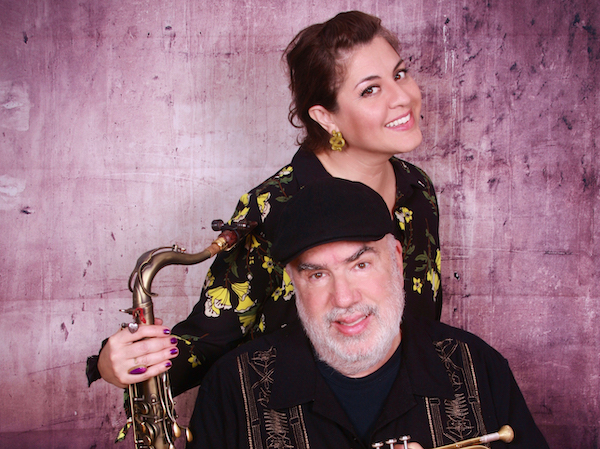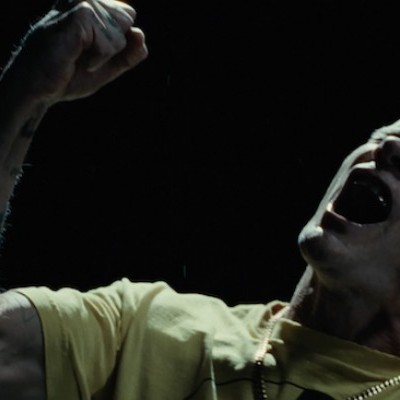Dec 9, 2025 12:28 PM
In Memoriam: Gordon Goodwin, 1954–2025
Gordon Goodwin, an award-winning saxophonist, pianist, bandleader, composer and arranger, died Dec. 8 in Los Angeles.…

Saxophonist Ada Rovatti composed all of the songs on a recent album that features her husband, trumpeter Randy Brecker.
(Photo: Courtesy of Artists)When saxophonist Michael Brecker died from a rare blood disorder in early 2007, trumpeter Randy Brecker lost both a brother and a bandmate. Together, they formed one of the most powerful front lines in jazz.
These days, Ada Rovatti, Randy’s wife of 19 years, is ably holding down the saxophone chair in a reconstituted edition of the Brecker Brothers Band. At the same time, she’s supplying fresh compositions and an emotional boost to her husband.
“We’re as close as can be,” Brecker said as he gazed at Rovatti over a salad at their Long Island home during January.
The simpatico was evident on the bandstand a few days later as the couple—fronting a septet Randy dubbed the Brecker Brothers Band 2020—dazzled on the second night of a midweek engagement at the Broadway club Iridium. Sparks flew between the two, from the opener, 1975’s “Sponge,” to the closer, “Some Skunk Funk,” the title track of a 2005 concert album that earned Randy one of his seven Grammy awards.
The couple’s closeness was especially apparent halfway through the 90-minute set, when the band launched into “Sacred Bond,” a riveting Rovatti original inspired by the couple’s feelings for their 11-year-old daughter, Stella. As Rovatti’s tenor reached into the upper registers, a knowing glance yielded to an uncharacteristically wide smile on Brecker’s face, softening his countenance.
“Sacred Bond” was drawn from a new album of her original compositions, Brecker Plays Rovatti: Sacred Bond (Piloo). So, too, were the soulful “Reverence,” an ode to Aretha Franklin, and the episodic “The Baggage,” a ballad that morphed into a no-holds-barred colloquy between drummer Rodney Holmes and percussionist Café Da Silva. Both musicians also appear on the album, as do the others who performed at the Iridium gig: guitarist Adam Rogers, keyboardist David Kikoski and bassist Alexander Claffy.
The album, 10 tunes in all, was a long time coming. Rovatti, a native of Italy who studied at Berklee College of Music, met Brecker in 1996. Randy was a star, she an inexperienced 19-year-old saxophonist. But Rovatti has played classical piano since age 4. “My first language is really music,” she said. “I learned music before I learned words.” And over the years her saxophone playing evolved. In 2003, she appeared on Randy’s Grammy-winning album 34th N Lex (ESC), one of three saxophonists—the others were the veterans Ronnie Cuber on baritone and David Sanborn on tenor—to join Michael Brecker among the personnel.
That same year, Randy appeared on Rovatti’s second album, Under The Hat (Apria), alongside luminaries Mike Stern (guitar) and Don Alias (percussion).
Two years later, when Michael became ill, Randy tapped Rovatti to fill in at a live performance with the Brecker group and Igor Butman’s big band in Russia. The rest is musical—and marital—history.
“She was kind of thrust into it,” Brecker explained. “It was trial by fire. She learned all the tunes and sounded great. She didn’t try to play like Mike. I don’t want someone to sound like Mike, specifically. There’s an influence there, but she really sounds like herself.”
To be sure, Rovatti has assimilated the Brecker-like synthesis of John Coltrane and King Curtis. And her study methods recall Michael’s—keeping voluminous notes, which are stored in her music room down the hall from Randy’s in the converted basement of the home that they also share with two cats. Michael’s notebooks now are a part of his archive at William Paterson University.
“He wrote everything down,” Brecker said. “Ada’s the same way.”
But there are distinct differences. For starters, Michael abandoned the soprano saxophone, while Rovatti concentrates on it—as evidenced by her wicked turn at the Iridium gig on “Above And Below,” the vehicle for which Randy earned a Grammy nomination for best jazz instrumental solo in 1993. This year, Randy won in that category for “Sozinho,” off Rocks (Piloo), a collaboration with the NDR Bigband, for which Rovatti plays both soprano and tenor.
Ultimately, Rovatti might be most distinguished by the particulars of her writing. In the sly dissonances of “Mirror” (a reflection, she said, “on a woman struggling to see who she used to be”), the brooding inflections of “Helping Hand” (a plea to “help in a world without much kindness”) and the pulsating lyricism of “Sacred Bond”—all on the new album—she adds to an oeuvre shaped in no small measure by the personal and professional influence of her husband. DB

Goodwin was one of the most acclaimed, successful and influential jazz musicians of his generation.
Dec 9, 2025 12:28 PM
Gordon Goodwin, an award-winning saxophonist, pianist, bandleader, composer and arranger, died Dec. 8 in Los Angeles.…

Belá Fleck during an interview with Fredrika Whitfield on CNN.
Jan 13, 2026 2:09 PM
The fallout from the renaming of the John F. Kennedy Center for the Performing Arts to include President Donald…

The success of Oregon’s first album, 1971’s Music Of Another Present Era, allowed Towner to establish a solo career.
Jan 19, 2026 5:02 PM
Ralph Towner, a guitarist and composer who blended multiple genres, including jazz — and throughout them all remained…

Flea has returned to his first instrument — the trumpet — and assembled a dream band of jazz musicians to record a new album.
Dec 2, 2025 2:01 AM
After a nearly five-decade career as one of his generation’s defining rock bassists, Flea has returned to his first…

Rico’s Anti-Microbial Instrument Swab
Jan 19, 2026 2:48 PM
With this year’s NAMM Show right around the corner, we can look forward to plenty of new and innovative instruments…